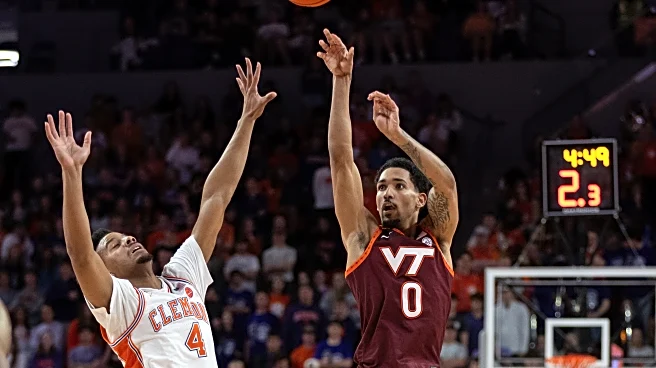What's Happening?
Penn State University has dismissed head football coach James Franklin following a series of disappointing losses that have derailed the team's season. Franklin, who has been with Penn State for over a decade, was let go after a narrow 22-21 defeat to Northwestern, which effectively ended the team's chances of reaching the College Football Playoff. The Nittany Lions, who were ranked No. 2 in the preseason, have suffered three consecutive losses, including a home defeat to Oregon and a road loss to UCLA. Terry Smith will serve as interim head coach for the remainder of the season. Franklin's tenure at Penn State included a Big Ten title in 2016 and consistent appearances in national rankings, but his teams struggled against top-tier opponents, going 4-21 against top 10 teams.
Why It's Important?
The firing of James Franklin marks a significant shift for Penn State's football program, which has been a staple in college football under his leadership. The decision to part ways with Franklin, despite a costly buyout, underscores the university's commitment to achieving higher standards and competing for national championships. This move could impact recruiting and the team's performance in upcoming games, as Penn State faces challenging matchups against Iowa, Ohio State, and Indiana. The change in leadership comes at a time when the university is investing heavily in its athletic facilities, including a $700 million renovation of Beaver Stadium, highlighting the importance of football success to the institution's broader goals.
What's Next?
With Terry Smith stepping in as interim head coach, Penn State will aim to stabilize its season and potentially play the role of spoiler in upcoming games against top-ranked opponents. The search for a permanent head coach will likely begin soon, with Athletic Director Pat Kraft expressing confidence in attracting elite candidates. The team's performance in the remaining games could influence the selection process and the future direction of the program. Additionally, the financial implications of Franklin's buyout and the ongoing stadium renovation will be factors in the university's strategic planning.
Beyond the Headlines
The firing of James Franklin raises questions about the pressures and expectations placed on college football coaches, particularly in programs with a rich history and significant financial investments. The decision reflects broader trends in college sports where performance and competitiveness are closely tied to institutional priorities and financial commitments. The move also highlights the challenges of maintaining a successful program in the face of high expectations and the evolving landscape of college athletics.









